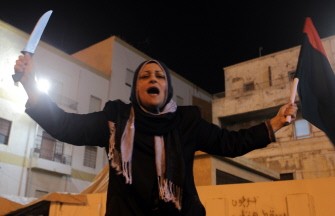BRUSSELS, March 18, 2011 (AFP) - A coalition of Western nations mobilised Friday to launch quick air strikes against Libya after the UN approved military action to prevent Moamer Kadhafi from crushing insurgents.
The United States, Britain and France were expected to scramble fighter jets against Kadhafi's forces after they secured the UN Security Council's blessing.
Paris warned military action was imminent.

The strikes will come "rapidly... within a few hours," French government spokesman Francois Baroin said after the UN Security Council approved "all necessary measures" to impose a no-fly zone on Libya.
The goal of the operation would be to "protect the Libyan people and to allow them to go all the way in their drive for freedom, which means bringing down the Kadhafi regime," Baroin told RTL radio.
The three military powers could be joined by Canada, which according to Canadian media planned to deploy six CF-18 fighter jets.
Norway said it would take part in the operation and Denmark awaited parliament approval before joining the action with F-16 warplanes. Poland offered logistical support but no role in a military strike force.
NATO was holding a meeting to decide what, if any, role it may take.
The West could be joined by Arab nations in the endeavour after the Arab League pressed for the international community to impose a no-fly zone against Kadhafi's forces.
Qatar's foreign ministry said the Gulf state would "contribute in the efforts aiming at stopping bloodshed and protecting civilians in Libya" and urged quick action to impose the no-fly zone, the state news agency said.
The UN's approval of the measures sparked celebrations in the rebel bastion of Benghazi in eastern Libya where the opposition had urged the international community to act quickly.
British Foreign Secretary William Hague said the UN measures were needed to "avoid greater bloodshed" and stop Kadhafi from attacking his own people.
"This places a responsibility on the members of the UN and that is a responsibility to which the United Kingdom will now respond," Hague said.
Britain's Royal Air Force is expected to send Tornado attack aircraft equipped with precise weapons from their bases in Marham, east England, and Lossiemouth in Scotland.
NATO convened a meeting to debate whether the 28-nation military alliance would take part of the international effort.
"For any NATO operation, there needs to be a demonstrable need for the alliance to act, firm regional support and a clear legal basis," said NATO spokeswoman Oana Lungescu.
"Under those three conditions, NATO stands ready to act as part of the broad international effort," she said.
NATO allies have been divided about intervening in Libya, with Germany and Turkey voicing opposition to a military intervention.
Germany was among five nations, alongside China and Russia, that abstained from voting for the UN resolution, which passed 10-0 late Thursday.
Warning of "considerable risks and dangers," German Foreign Minister Guido Westerwelle insisted no German troops would participate in military intervention.
"We remain eminently sceptical on the option of military intervention... anticipated in this resolution. We see in it considerable risks and dangers. That is why we could not approve this part of the text," a statement said.
Russia also ruled out taking part in the operation.
The UN Security Council also agreed to protect civilian areas and impose a ceasefire on Kadhafi's military, but ruled out sending ground troops.
























